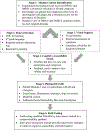Developing the Diagnostic Interview for Adolescents and Adults with Mild/Moderate Intellectual Disabilities: An interview schedule of mental disorders (DIAAID)
- PMID: 38895708
- PMCID: PMC11182657
- DOI: 10.1080/19315864.2023.2214089
Developing the Diagnostic Interview for Adolescents and Adults with Mild/Moderate Intellectual Disabilities: An interview schedule of mental disorders (DIAAID)
Abstract
Introduction: Young people with intellectual disabilities (ID) are at an increased risk for experiencing mental health issues compared to their peers without disabilities. Further, there are limited resources available to help accurately assess mental health disorders and that are accessible for adolescents with ID.
Method: This paper describes the iterative development and pilot testing of the Diagnostic Interview for Adolescents and Adults with Intellectual Disabilities (DIAAID). The authors utilized Evidence Center Design and Universal Design principals to develop the DIAAID; a multi-informant diagnostic interview.
Results: The DIAAID development resulted in the creation of 15 adolescents disorder interviews and 24 caregiver disorder interviews. Preliminary results suggest that the DIAAID is a feasible and accessible diagnostic interview for adolescents with ID and their caregivers.
Discussion: Lessons learned from DIAAID implementation and future areas research are discussed.
Keywords: Adolescent; Intellectual Disabilities; Mental Health.
Figures
Similar articles
-
Co-creating an intervention to promote physical activity in adolescents with intellectual disabilities: lessons learned within the Move it, Move ID!-project.Res Involv Engagem. 2023 Mar 19;9(1):10. doi: 10.1186/s40900-023-00420-x. Res Involv Engagem. 2023. PMID: 36935503 Free PMC article.
-
Promoting Healthy Behaviors Among Adolescents and Young Adults With Intellectual Disability: Protocol for Developing a Digital Intervention With Co-Design Workshops.JMIR Res Protoc. 2023 Jul 28;12:e47877. doi: 10.2196/47877. JMIR Res Protoc. 2023. PMID: 37505807 Free PMC article.
-
Conducting theory-based qualitative interviews with adults with intellectual disabilities and their carers: Adaptations to facilitate participation.J Appl Res Intellect Disabil. 2022 Mar;35(2):556-568. doi: 10.1111/jar.12966. Epub 2021 Dec 6. J Appl Res Intellect Disabil. 2022. PMID: 34873792
-
[Diagnostic structured interviews in child and adolescent's psychiatry].Encephale. 2004 Mar-Apr;30(2):122-34. doi: 10.1016/s0013-7006(04)95422-x. Encephale. 2004. PMID: 15107714 Review. French.
-
Sexual health education for adolescents and young adults with intellectual and developmental disabilities: recommendations for accessible sexual and reproductive health information.Lancet Child Adolesc Health. 2020 Sep;4(9):699-708. doi: 10.1016/S2352-4642(20)30098-5. Lancet Child Adolesc Health. 2020. PMID: 32827491 Review.
References
-
- American Educational Research Association, American Psychological Association, National Council on Measurement in Education. (2014). Standards for educational and psychological testing. Washington, DC: American Educational Research Association.
-
- American Psychiatric Association. (2013). Diagnostic and statistical manual of mental disorders (5th ed.). Washington, DC: American Psychiatric Association.
-
- Bell H, Ownsworth T, Lloyd O, Sheeran N, & Chambers S (2018). A systematic review of factors related to children’s quality of life and mental health after brain tumor. Psycho‐oncology, 27(10), 2317–2326. - PubMed
-
- Buckles J, Luckasson R, & Keefe E (2013). A systematic review of the prevalence of psychiatric disorders in adults with intellectual disability, 2003–2010. Journal of Mental Health Research in Intellectual Disabilities, 6(3), 181–207.
-
- CAST (2018). Universal Design for Learning Guidelines version 2.2. Retrieved from http://udlguidelines.cast.org
Grants and funding
LinkOut - more resources
Full Text Sources

